How To Stop A Dog From Digging Holes Under Fences, In Bed, In Yard & More – Why Do Dogs Dig Holes?
When you purchase through links on our site, we may earn a commission. Here’s how it works.

Why do dogs dig holes? Is your yard starting to look like a minefield? It’s important to know that your dog isn’t intentionally trying to be malicious and ruin your landscaping. Instead of getting upset with your furry friend, consider why your dog may be digging holes in your backyard. Is it bad for dogs to dig holes? Here are some common reasons your dog might dig holes in your yard and how to stop a dog from digging.
Why Do Dogs Dig Holes?

Digging can be a normal dog trait, just like barking and sniffing. However, there could be more purpose behind your dog’s digging. Below are some reasons why your dog is digging holes in your yard.
- Out of boredom
- Lacking adequate exercise (find out how much exercise dogs need)
- Attempting to escape the yard because they’re scared (perhaps from a thunderstorm) or they’re trying to get to something outside of the yard
- Anxiety and separation issues from their general lifestyle, not necessarily from the condition of the backyard
- Hearing the sounds of underground creatures and bugs
- Smelling something buried in the ground
- Escaping the summer heat
- Lacking minerals in their diet
- Stashing away food or items of shelter
- Natural mating behavior for females
- It’s in their breed (e.g., Terriers have had digging bred into them to help catch prey)
- Creating a comfortable place to rest
How To Stop A Dog From Digging Holes: 12 Tips
Depending on the reason, you need to take different approaches to get your dog to stop digging holes in your yard. Consider trying some of these methods to get your dog to stop digging holes in your yard.
1. Designate A Dig Spot
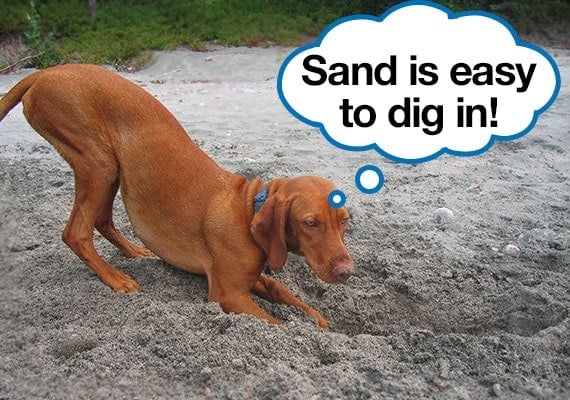
Designate a “dig spot,” bury treats and toys underground, and loosen the soil to entice your dog only to dig in that area. Create a special digging zone where your pup can dig to their heart’s content. This could be as easy as tilling the earth in a specific section of your yard – dogs prefer to dig where the soil is soft and sandy.
If you have the time and money, you could take this concept a step further and create a sandy area just for your dog to dig in. Children’s sandboxes work great here. A sandbox with a cover keeps the area clean and free of neighborhood pests.
You can encourage your dog to use this area by sprinkling or burying treats. You can even hide dog toys below the surface – when your dog digs here, he is rewarded! By regularly hiding surprises in your dog’s dig pit, he won’t want to dig anywhere else.
2. Prevent Boredom: Give Your Dog Toys
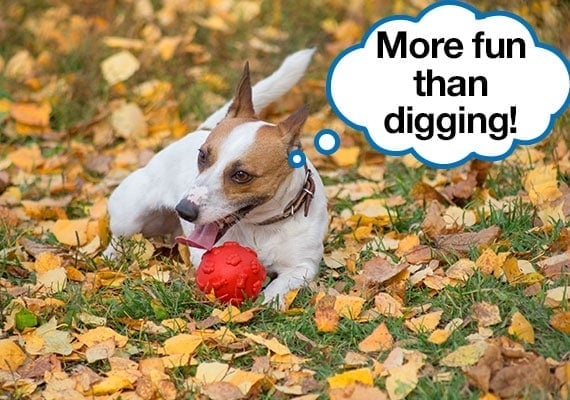
If you don’t have the space to create a safe dig zone for your pup, there are still ways to help them get out that instinct without ruining your yard. One toy in particular, the iFetch iDig Stay Dog Digging Toy, allows for non-destructive digging. It is a puzzle feeder mat that your dog can dig and scratch without any damage to your home or yard.
You can also try a snuffle mat or snuffle ball. Or, if your pup likes to chase, try a herding ball to get them active with an enjoyable activity that does not involve digging. Another option, the Babble Ball, talks to your pup as they bat it around the yard or house. Try to offer a healthy rotation of toys so your dog doesn’t tire of playing with the same things. Check out this video of one of our canine team members playing with an interactive treat ball.
3. Try Brain Training Games
Introduce brain training games to keep your pup mentally stimulated. Bored dogs look for things to do, and digging absolutely fills that void. Interactive toys engage them mentally and can greatly help deter unwanted behavior like digging. There are brain training courses online and even video games you can play with your pup.
4. Make It Harder To Dig: Modify Your Yard & Create A Dig Barrier

Making your yard less dig-friendly is another route to take. This can be done in a few different ways. Start by removing or blocking off the softer dirt and sand that is easier to dig in. You can add pointy plants, harsher ground cover like gravel, and fencing to block off areas you do not want your dog to have access to.
You can bury chicken wire or wire mesh in the areas your pup is most prone to dig to create a barrier. Lay the barrier flat over the area your pup wants to dig or reinforce areas near the fencing. Cover the wire with a layer of dirt. Chicken wire is metal, so it will rust and have sharp edges. If you choose this method, you must be vigilant about keeping it safe for your pup to prevent injury. If you can find it, plastic poultry fencing works just as well, without the sharp edges. This method is a lot of work but is quite effective.
5. Discourage Digging With Deterrents

Dogs are often drawn to certain areas because of their smell or taste. This can be due to the presence of food in the area or even the urine and feces of other animals. You can try a digging deterrent to discourage them from getting busy in a certain spot. These substances make the ground taste and smell very unpleasant and can help discourage your pup from making it their dig spot.
Common Digging Deterrent Methods
- Cayenne pepper
- Citrus fruit (oranges, lemons, grapefruit)
- Coffee grounds
- Citronella essential oil
- Anti-chew sprays
6. Address Your Dog’s Anxiety And Fear

If dogs are digging out of stress, separation anxiety, or fear, you must address the root of the problem first. Try to avoid letting your dog outside during thunderstorms, fireworks, or other times when your dog may be more likely to get scared (if your dog needs to go out, consider putting the leash on or try noise-canceling headphones). Look for changes in your routine or home that might be causing your dog anxiety. There will likely be other signs, including aggression, restlessness, excessive barking, and other destructive behaviors. Some dogs with anxiety may start to have odd potty behavior and accidents.

Treatment for anxiety includes finding the triggers, desensitizing your dog to them, and even behavioral training in some cases. Talk to your vet and look for a professional dog trainer if your dog’s anxiety persists.
You can also try calming chews and treats. These included things like CBD, melatonin, and tryptophan, which help regulate your pup’s mood and may help deter some of the anxiety. An anti-anxiety bed may be helpful to keep your pup calm.
7. Provide Shelter

Sometimes, dogs seeking shade or a break from cold weather dig to create a shelter. This may be the case if your dog seems to dig more around weather changes. They may want to feel safe and create a place where they feel protected. Setting up a dog house or shade spot may help deter this kind of digging. A dog house gives your pup a safe place with less noise and protection from the elements. Learn more about different kinds of dog houses here.
When Is It Too Hot Or Cold For A Dog To Be Outside?
We discuss when it’s too cold for a dog and ways to keep your pup cool on a hot day. Always provide a respite from cold weather, as well as shade on hot days and plenty of fresh water for dogs kept outside for long periods of time.
8. Training
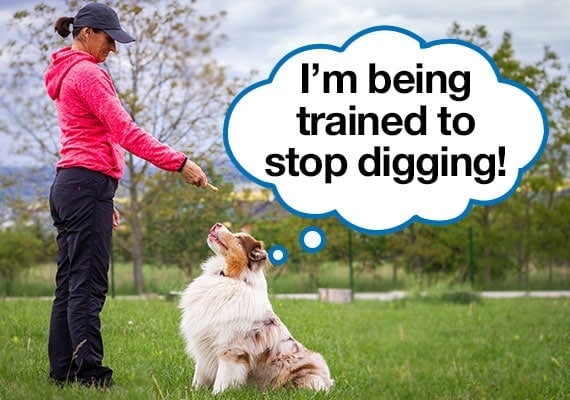
Some dogs dig to get attention and may need training to learn not to dig. Can you imagine asking your dog to stop digging and have him obey? It might seem hard to believe, but you can do that with proper training. By teaching your dog the stop or sit command, your dog will stop what he is doing when you tell him to. Redirect that energy to a new toy, safe dig pit, game, etc.
9. Stop Treat And Food Hiding

Back when dogs roamed wild, they would dig holes to hide their unfinished food. Once the food was inside, they would cover it back up. Think of this hole as a refrigerator for dogs. They would dig up their hidden meal the next time they were hungry.
Nowadays, dogs have it too easy. They don’t need to hunt. And if your pup is like mine, he gets a steady supply of treats between meals, too. Even so, your dog still has these natural instincts. Despite knowing he won’t go hungry, the desire to hide food is irresistible.
Some dogs will dig to bury food and treats, creating a private stash in the yard. Look closely at the hole your dog has dug. If you see food, treats, or toys inside, you’ll know you need to deal with your pup’s instincts.
The first step is removing anything your dog buried in your yard. If you don’t, your pup will dig it up again. Next, make sure you are not over-feeding your dog. If your dog is full but has food left over, he will be more likely to hide it. Dogs are less likely to bury bite-sized treats. Larger treats like bully sticks, yak chews, or bones, on the other hand, are more likely to be saved for later. Switching to a smaller treat could be all it takes to stop your dog from digging up your yard.
10. Rule Out A Medical Issue

Sometimes, a medical issue, like pregnancy, pain, arthritis, skin irritations, fever, or pica, may trigger a dog to dig. Pregnant mama dogs often dig as a form of nesting. Dogs in pain or who feel sick may dig, seeking a hidden spot to rest. Take your dog to the vet for an exam to rule out any underlying medical issues. You should also ensure your dog is eating a well-balanced diet (find the best dog food for your pup).
11. Check For Rodents

Is your dog digging in a single location over and over again? He may be trying to dig up an animal hiding in your soil. Some common pests that hide in the dirt include:
- Gophers, groundhogs, moles, and voles
- Rats, mice, and rabbits
- Squirrels and chipmunks
- Lizards and snakes
- Bugs, insects, and grubs
- Frogs and toads
And if your curious dog gets a scent, he will dig up your yard until he finds his prey. The solution is simple: Remove the animal your dog is hunting, and your hole-digging problem is solved.
Typically, the best way to keep these pests out of your yard is to remove their food source. For instance, moles will move on if there are no grubs to eat. Depending on the pest, you may need to contact the exterminator or even animal control. Whatever pest removal method you use, make sure it’s dog-safe. Many pesticides are toxic to dogs.
More About Pet-Safe Pest Control
Learn more about the best pet-safe pest control options and how to create a safe backyard habitat for wildlife and your dog.
12. Build A Doggie Playground
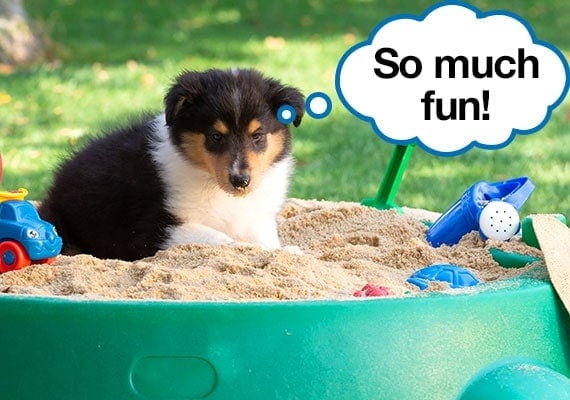
Provide your pup with a backyard that is fun to play in. Add things like obstacle or agility courses, a pool to splash around in, platforms to climb, a dog run, ramps, buried tires to create a tunnel, and a ball pit. These are all fun ideas to keep your pup entertained and not digging. You can work on this over time and add new elements to it.
My Personal Experience With Dogs Digging Holes
I have had many dogs that like to dig, but one in particular was my Labrador Retriever Bear. His digging was a huge problem, and he started to damage my neighbor’s yard as he liked to dig under the fence. The holes were also a safety issue because my smaller dog could wriggle through them and get out of the yard.
Bear was a big dog, 85 pounds, and could dig some huge holes. After my neighbor asked me to pay to fix the damage, I knew I had to stop this behavior. After unsuccessfully trying to get him to stop digging using deterrent sprays and cayenne, I knew I had to do a little more. So, I approached the problem in two ways. I buried chicken wire all along the fence, 2 feet deep, covering it with sand and rocks. This made it harder to dig and created a barrier between my yard and all my neighbors.
Next, I made Bear a huge digging pit right in the middle of my yard. I filled it with soft sand and would bury toys for him to find. I had to train him to use the dig pit, but after a few weeks, it seemed like an old habit. My yard was not full of holes, and no more upset neighbors when my dog dug under the fence.
Tips From A Trainer On How To Stop Dogs From Digging (Video)
This quick three-minute video has more tips about why dogs dig and how to get a dog to stop digging. One of the tips mentioned is to use deer-repellent crystals.
How To Keep Dogs From Digging Under Fences
Here are some ideas to keep your dog in your yard and how to stop a dog from digging under the fence specifically.
- Bury chicken wire at the base of the fence and cover it with mulch or river rock
- Partially bury larger rocks along the bottom of the fence line
- Anchor the bottom of a chain-link fence with landscape staples
- Use a wireless fence to prevent your dog from being interested in approaching the fence line
Why Do Dogs Dig In Their Beds?
Wondering why dogs scratch their beds? Dogs like to dig in their beds and do circles to chase away any unwanted pests. Before dogs were domesticated, they’d lie down in the tall grass and stomp around to create safety and comfort. This meant they wanted to scare off any rodents, snakes, etc., to ensure the space was only theirs.
Digging and circling are also ways for them to mark their area with their paws’ scent. A dog’s paws have sweat glands that help mark their resting place with their scent.
This natural burrowing dog bed provides a great way for your dog to “dig” the perfect space in its bed without wrecking it. Our dogs have tried this product out and truly adore it.
If your dog’s bed is destroyed from all the digging, consider one of these dog beds or an elevated dog bed as a replacement.
Why Do Dogs Dig In Carpets?
Similar to the answer above, dogs dig in carpets to find a comfortable place to lie down. They’re trying to create a safe place to rest and don’t care too much about the integrity of your home’s flooring.
My Dog Is Eating Dirt When He Digs. Is This Safe?

Does your dog have dirt all around his mouth when he digs? He is probably eating it, which means it’s probably time for a trip to the vet. I’m not talking about a taste of soil now and then. But it may be an issue if your dog frequently eats dirt or consumes large amounts of it.
You see, frequently digging and eating dirt may be an indicator that your dog’s diet is lacking in essential nutrients. This is often a result of an unbalanced homemade diet. While you may not be aware of this, your dog is and will eat dirt to try and make up for the nutrients he lacks.
According to veterinarian Dr. Sara Ochoa, DVM, several other medical disorders can cause a dog to dig and eat dirt:
- Anemia
- Pica
- Upset stomach
- Gastro intestinal parasites
These are all issues that you want to address as early as possible. When in doubt, ask your vet.
If this is a one-off occasion, your dog may be digging because food was spilled there, which can give the soil a yummy taste. We explain this further in the video below.
Frequently Asked Questions
Dogs digging holes is sometimes just natural behavior, but it can be a problem for owners. I’ve covered some of the most often-asked questions below. I’d love to hear it in the comments if I didn’t get to yours or if you have an experience to share.
Does Burying Dog Poop Discourage Them From Digging?
Dogs can be motivated to dig things they smell under the dirt. The concept of burying dog poop in the area they dig may discourage some pups, but it can have the opposite effect on others. Additionally, it is quite messy and not guaranteed to work. There are other deterrents you can use that I would recommend before buying poop.
Is Burying A Balloon A Way To Deter A Dog From Digging?
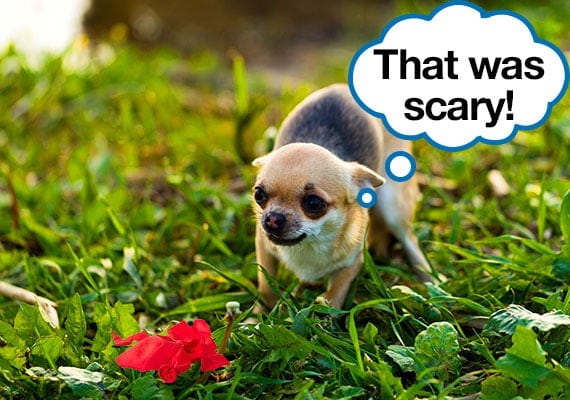
This is another method that sometimes works and sometimes doesn’t. I don’t usually recommend this one because it uses fear to discourage the behavior. The idea is to bury a balloon where the dog digs, which will pop when they get to it, scaring them and discouraging them from digging there again. It may work, but it can also be anxiety and stress-causing to your dog.
Does Water Work To Stop Dogs Digging Holes?

It can, but only if your dog doesn’t like water. For dogs that don’t mind it, a sprinkler or hose spraying on them while digging just makes mud and doubles the fun.
Some Breeds Are Born Diggers

For some breeds of dogs, digging comes as naturally as peeing on a fire hydrant and sniffing butts. Natural-born diggers include Terriers (Yorkies, Jack Russells, Fox Terriers, etc.) and Dachshunds. These breeds are known as earth dogs and were bred to chase rats and other unwanted rodents through underground tunnels – often, they would have to dig their way in.
For these dogs, digging is in their blood, and you do not quickly train out this behavior. While owning one of these dogs doesn’t guarantee a lawn full of holes, it does raise the chances of problem digging.
Other Odd Dog Behaviors
In addition to digging holes, our canine friends have many more habits that are somewhat curious and maybe even a little gross to us humans. These habits can range from dogs eating poop, dogs rolling in poop, and dogs eating dirt. If you’re struggling to prevent unwanted behavior in your dog, consider getting help from a professional dog trainer or speaking with your vet about your dog’s actions. Your dog may have a digestive disease or a medical disorder that requires prompt, professional treatment.
Why Trust Canine Journal?
Danielle has raised rescue animals for over thirty years. She has a special place in her heart for mixed breeds and dogs with special medical needs. Danielle has had several dogs who liked to dog holes and has tried many of these deterrent methods herself. Danielle is a dedicated researcher with a background in education and behavior management. She works alongside a talented team at Canine Journal who strive to bring our readers the best, most relevant information to better their lives.




